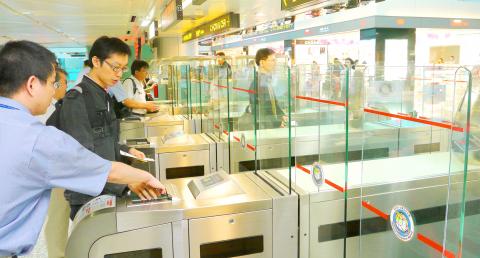The Taipei District Prosecutors’ Office and the Agency Against Corruption have discovered that National Immigration Agency (NIA) officials bought biometric equipment from China for use in the e-Gates in the nation’s three major airports, sources said on Saturday.
The biometric equipment, which has been in use since 2012 at Taiwan Taoyuan International Airport, Kaohsiung International Airport and Taipei International Airport (Songshan airport), allows fast-track passport control for frequent travelers by using biometric verification methods such as facial recognition and fingerprint identification, and might have been compromised by China-made software and equipment, sources told the Liberty Times (the sister paper of the Taipei Times) on condition of anonymity.
The allegation has alarmed government investigators and security experts, who fear the e-Gates would be vulnerable to hacks by China or other groups seeking to obtain privileged information, or to circumvent travel restrictions on criminals or others, sources said.

Photo: Tony Yao, Taipei Times
The Public Construction Commission’s regulations bar the purchase of equipment or technology from China that are “of a sensitive nature or might affect national security.”
Investigators reportedly suspect the bid for e-Gate computers and software was rigged by Transtep Technology Group (跨越科技) owner Lee Chi-shen (李奇申) and then-immigration agency information section chief Shih Ming-te (施明德), sources said.
They said investigators suspect Lee conspired to fix the bid for e-Gate computers and software as early as 2009.
Lee allegedly arranged for other industry figures to submit bids on his behalf and surreptitiously dictated the technical requirements of the project by writing the code for the border control’s operating system, sources said.
While e-Gate contractor Ho Fan Co (和範) is nominally a Fuji Xerox subsidiary, Transtep Technology was in control of all business related to the e-Gate contract, sources said.
TECO Smart Technologies Co (東元捷德), which supplied the e-Gate equipment to Ho Fan, allegedly imported the machines from China and then claimed they had been manufactured in Taiwan, the sources said.
Prosecutors and anti-corruption officials are concerned that Lee appears to have held a monopoly on the government’s procurement of e-Gate systems, they said.
There are fears that Lee might have knowingly or unknowingly compromised the border control apparatus via pre-installed backdoors, which could be exploited by a third party, sources said.
Lee is suspected of having connections to “specific individuals” in China and was known to have sent personnel to Shenzhen for “training,” raising fears that Lee had “nullified” the nation’s border controls and endangered travelers’ privacy, they said.
The sources said Lee and Shih are suspected of involvement in no fewer than seven allegedly rigged tenders over the past eight years and there are concerns the two men might have been acting under the instructions of others.
Shih and former immigration information section chief Chen Ying-chieh (陳英傑) were among the 41 people questioned last month by prosecutors in connection with the suspicious contracts.
Prosecutors in Taipei yesterday would only confirm that an investigation is underway.
Additional reporting by CNA

Taiwanese actress Barbie Hsu (徐熙媛) has died of pneumonia at the age of 48 while on a trip to Japan, where she contracted influenza during the Lunar New Year holiday, her sister confirmed today through an agent. "Our whole family came to Japan for a trip, and my dearest and most kindhearted sister Barbie Hsu died of influenza-induced pneumonia and unfortunately left us," Hsu's sister and talk show hostess Dee Hsu (徐熙娣) said. "I was grateful to be her sister in this life and that we got to care for and spend time with each other. I will always be grateful to

REMINDER: Of the 6.78 million doses of flu vaccine Taiwan purchased for this flu season, about 200,000 are still available, an official said, following Big S’ death As news broke of the death of Taiwanese actress and singer Barbie Hsu (徐熙媛), also known as Big S (大S), from severe flu complications, the Centers for Disease Control (CDC) and doctors yesterday urged people at high risk to get vaccinated and be alert to signs of severe illness. Hsu’s family yesterday confirmed that the actress died on a family holiday in Japan due to pneumonia during the Lunar New Year holiday. CDC Deputy Director-General Tseng Shu-hui (曾淑慧) told an impromptu news conference that hospital visits for flu-like illnesses from Jan. 19 to Jan. 25 reached 162,352 — the highest

TAIWAN DEFENSE: The initiative would involve integrating various systems in a fast-paced manner through the use of common software to obstruct a Chinese invasion The first tranche of the US Navy’s “Replicator” initiative aimed at obstructing a Chinese invasion of Taiwan would be ready by August, a US Naval Institute (USNI) News report on Tuesday said. The initiative is part of a larger defense strategy for Taiwan, and would involve launching thousands of uncrewed submarines, surface vessels and aerial vehicles around Taiwan to buy the nation and its partners time to assemble a response. The plan was first made public by the Washington Post in June last year, when it cited comments by US Indo-Pacific Commander Admiral Samuel Paparo on the sidelines of the Shangri-La Dialogue

Suspected Chinese spies posing as Taiwanese tourists have been arrested for allegedly taking photographs of Philippine Coast Guard ships, local media reported. The suspected spies stayed at a resort in Palawan, where from a secluded location they used their phones to record coast guard ships entering and leaving a base, Philippine TV network GMA said on Wednesday. Palawan is near the Spratly Islands (Nansha Islands, 南沙群島) and other disputed areas of the South China Sea, where tensions have been on the rise between China and the Philippines. The suspects allegedly also used drones without permission and installed cameras on coconut trees in the